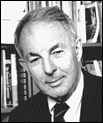![]()
![]()
![]()
![]()
![]()
![]()
Middlekauff
Lectures on Early American Democracy
Public Health
School Receives $4.5 Million to Study Children with Leukemia
in 35 California Counties
By Julia Sommer,
Public Affairs
Posted March 10, 1999
|
|
|
He was continuing a tradition started in 1913 by UC President Benjamin Ide Wheeler and honored every year since except for 1919.
An Academic Senate committee consisting of previous faculty research lecturers selects two recipients each year. A number of past lecturers came to hear Middlekauff and attend a University House dinner in their honor afterwards.
The list of faculty research lecturers, including Nobelists and namesakes of campus buildings, covers every field and reads like a "Who's Who" of Berkeley's intellectual giants.
Introducing Middlekauff, Chancellor Berdahl noted that "appointment as a faculty research lecturer is among the highest honors that Berkeley faculty confer on their colleagues."
Middlekauff spoke on "Democracy in America Before Tocqueville." (Alexis de Tocqueville was a Frenchman who arrived on our shores in 1831 and wrote the first and most profound description of the young United States, "Democracy in America.")
In his drily witty way, Middlekauff noted that, "there has never been much use for history in the United States. . . . We're obsessed with the future. The past is for somebody else, not for Americans."
But to understand our democracy today, he said, we have to understand how it came to be. And that long, slow process began with 17th-century New England Protestants.
"Protestants throughout the colonies were impatient with Old World authority," said Middlekauff. "Laymen insisted on their right to make decisions. They chose and directed their clergy, and sometimes served as clergy. They believed in individual judgement and autonomy. A congregational democracy existed in the colonies before a political democracy."
Another reason democracy took hold in the American colonies was the widespread ownership of land, Middlekauff noted.
As in England, only white male landowners had the right to vote. In 18th-century England, that amounted to about 20 percent of the adult male population, but in the American colonies, where land was cheap and abundant, well over 50 percent of men had the franchise, said Middlekauff.
Colonial governors were routinely frustrated by confrontations with independently elected colonial legislatures that did the bidding of their constituents, he said.
With no titled, privileged class and a growing population, there was a slow, steady increase in ordinary people participating in political life well before the American Revolution, said Middlekauff. "American democracy was not driven by a coherent body of thought, but evolved by itself," he noted.
Today democracy seems to be the "coming thing in much of the world, especially with the collapse of communism," said Middlekauff. "But our own experience cannot be applied elsewhere. Democracy came to the United States in a unique way. It cannot be imposed on a people; it must grow."
In answer to those who say American democracy is in peril, Middlekauff noted that "our past offers more reassurance than cause for alarm. Democracy is deeply embedded in the American culture. ... It has survived all its challenges, primarily because of its moral strength -- the belief that there is something worthy in every human being."
Randy Schekman, professor of molecular and cell biology,
will give the second 1999 faculty research lecture March 31
at 5:30 p.m. in Wheeler Auditorium. He will speak on
"Budding Yeast and the Brain."
![]()
![]()
March 10 - 16, 1999
(Volume 27, Number 26)
Copyright 1999, The Regents of the University of
California.
Produced and maintained by the Office
of Public Affairs
at UC
Berkeley.
Comments? E-mail berkeleyan@pa.urel.berkeley.edu.
